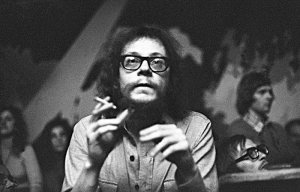Next London Theatre Seminar, 9 March 2017, with Dariusz Kosiński (Jagiellonian University, Kraków)
Posted: 2 March 2017 Filed under: seminars Leave a commentDear colleagues,
Please join us for our next London Theatre Seminar on Thursday, 9 March in the University of London Senate House (Room G35 Bloomsbury Room). We are pleased to bring you Dariusz Kosiński (Jagiellonian University, Kraków), a foremost expert on the theatre of Jerzy Grotowski. It starts at 6.30 PM and will close at 8.30, to reconvene in a local pub.
This talk is supported by the Grotowski Institute and TAPAC (Theatre and Performance Across Cultures)
We hope to see you there!
Broderick, Louise, and Bryce
Dariusz Kosiński: ‘Profanations: Jerzy Grotowski versus Polish national drama’

Jerzy Grotowski (1933–1999) is well-known as the creator of a kind of ‘theatre of ritual’ and of new approaches to acting. These achievements in the later stages of his work on productions at the Laboratory Theatre have overshadowed his earlier practice as a radical director and dramaturg. Even in Poland, the performances he created in the company’s initial phase of work in Opole in the early 1960s were long interpreted only as intermediary stages along the road towards his renowned ‘poor theatre’. This seminar will attempt to challenge this view, by analyzing three early performances by Grotowski and what was then known as the Theatre of the ‘13 Rows’ that were based on three canonical texts of Polish drama: Dziady (Forefathers’ Eve) by Adam Mickiewicz (premiere 18 June 1961), Kordian by Juliusz Słowacki (14 February 1962), and Akropolis by Stanisław Wyspiański (10 October 1962). Each of these productions was radical, both in the relationship to its source text(s) and in the particular theatrical environment established by Grotowski and his collaborators (especially the architect Jerzy Gurawski). However, the main thread that this lecture will follow is the way these works attacked Polish national myths, not only through acts of ‘blasphemy’ (as Grotowski later saw them) but through acts of profanation (in Giorgio Agamben’s sense of the term). In the specific historical context of the early 1960s, these profanations were more political than anthropological or ritualistic. This largely forgotten or overlooked political aspect of the performances will be addressed alongside core aspects of Grotowski’s dramaturgy and mise-en-scene.
Dariusz Kosiński is a professor in the Department of Performativity Studies at the Jagiellonian University, Kraków, Poland. At the beginning of his career, he specialized in the theory and history of nineteenth-century acting, publishing two books on the subject and editing a series of primary source materials. Later he focused on the tradition he named ‘Polish theatre of transformation’, developing as a throughline in the work of key Polish artists from Adam Mickiewicz to Jerzy Grotowski. His major publications in the field are Polish Theatre of Transformation (Polish edition 2007, English edition 2017), Grotowski: A Guide (Polish edition 2009, English edition 2017), and an alternative history of Polish performance Teatra polskie. Historie (Polish Theatre Histories) (Polish edition 2010, German edition 2012). From 2010 to 2013, he was Programme Director of the Grotowski Institute in Wrocław, and he also served as a member of the editorial board for Grotowski’s Teksty zebrane (Collected Texts, 2012). Since 2014, he has been Research Director of the Raszewski Theatre Institute in Warsaw. His most recent publications include a monograph on Polish performances after the presidential plane crash in Smolensk, titled Teatra polskie. Rok katastrofy (Polish Theatres: The Year of the Catastrophe, 2013), and a book on Grotowski’s early performances, Grotowski. Profanacje (Grotowski: Profanations, 2015).


